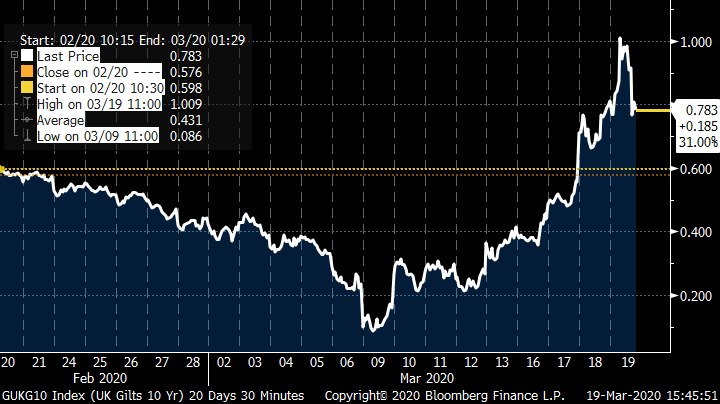Huge move by the BoE: Reacting to the sharp rise in Gilt yields in recent days, the BoE today announced its biggest ever one-off round of asset purchases on top of a further rate cut. The BoE’s press statement notes that ‘conditions in the UK gilt market have deteriorated as investors have sought shorter-dated instruments that are closer substitutes for highly liquid central bank reserves. As a consequence, UK and global financial conditions have tightened’. From a low sub-0.1% on the 9th March, 10 year Gilt yields had risen sharply (+90bps) in recent days – Chart 1. Yields have fallen following the announcement are currently trading at around 0.78% - see chart. The BoE is acting decisively to lower borrowing costs at a crucial time for both the government and the private sector. The government will need to raise a huge amount of finance on the open market to fund its massive coronavirus support package while many firms in the private sector will need to rely on generous credit lines to see them through the tough months ahead.
Reacting to growing risks: The Monetary Policy Committee (MPC) voted unanimously to cut the bank rate from 0.25% to 0.1% - its effective lower bound, and to restart QE (quantitative easing) worth of £200 billion - financed through the issuance of central bank reserves. It will take the total stock of bonds purchased through its APF (Asset Purchase Facility) – the BoE’s device for conducting QE - to a total of £645 billion. The BoE announced that it will mostly buy government bonds with a small allocation of some investment grade corporate bonds. The BoE bought £10bn of such paper after the Brexit vote. Highlighting the urgency at which BoE policymakers believes it must act, the press statement noted that ‘the purchases announced today will be completed as soon as is operationally possible, consistent with improved market functioning.’ Now that the BoE has reached its perceived lower bound on the bank rate, further stimulus will likely come through the form of QE. The purchases will take the BoE’s current holdings as a proportion of the current market value of gilts to around 25%. The BoE could, and we expect that it probably will, easily add even more government bonds to its balance if needed.
Expanded term funding scheme: The MPC also decided to expand the TFSME – Term Funding Scheme for SMEs. The BoE did not announce to what size this had been expanded. The initial announcement from last Wednesday suggested it could finance c£100bn in loans. Presumably, the BoE will publish further details soon. Based on the announcements a week ago, the scheme will allow participating banks and building societies to borrow from the BoE at, or very close to, the bank rate for up to four years. It is designed to reinforce the transmission of the rate cut to the real economy when rates are already low.
Avoiding a credit crunch: Across the world central banks and governments are working a hard to prevent the corona-virus recession from developing into a financial crisis. Through the huge central bank liquidity injections and government-backed loan guarantee schemes for businesses, policymakers are trying to ensure that cash-strapped firms get the generous credit lines that they need. The likely slump in global economic activity in the coming days and weeks as ever more countries impose shutdowns to manage the spread of the virus will go well beyond the usual dynamics of a downturn. Containing the virus is priority No. 1. However, policymakers must also see to it that the inevitable cash-flow crunch does not beget a financial crisis that would make the recession worse. Between the BoE’s actions to date and the additional fiscal measures announced on Tuesday, UK authorities are coordinating an unprecedented support package for the UK economy.
For our key notes on the coronavirus recession please see
Virus pandemic: The macro essentials
Crisis basics: Preventing a credit crunch
Chart 1: 10 year gilt yield (%) |
|
Source: Bloomberg |
Kallum Pickering
Senior Economist
Phone +44 203 465 2672
Mobile +44 791 710 6575
